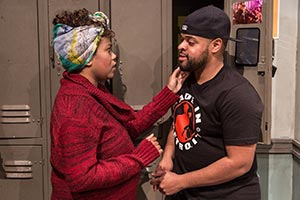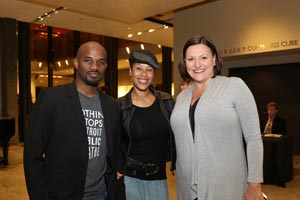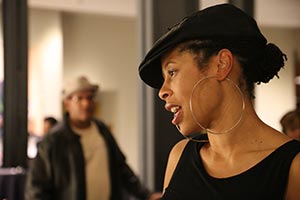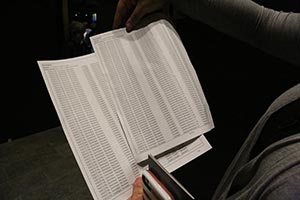Homecoming
It was hugs all around in the Detroit Symphony Orchestra lobby as friends and family embraced before a recent performance. Most kept their eyes on the glass door looking onto Woodward Avenue, awaiting the arrival of “Detroit’s playwright” to the Max M. & Marjorie S. Fisher Music Center.
Courtney Burkett, one of three producing artistic directors at Detroit Public Theatre (which uses the space for productions) clutched a list of the night’s attendees. About half of the 150 seats were reserved under the writer’s name: Dominique Morisseau.
It might have been Friday the 13th in October, but it was certainly one of the luckiest nights for one Detroit family. Motown expat Morisseau, BFA ’00, was home, catching a performance of Skeleton Crew, the third installment in what she calls her Detroit Trilogy. The show captures the fallout of the 2008 recession, and follows a group of soon-to-be-unemployed autoworkers whose plant is about to close.
Detroit native Morisseau attended Cass Tech High School, and while her plays have appeared on stages from Los Angeles to New York, they have only made their way to Detroit in the past year. So when the hometown playwright finally opened that glass door and entered the lobby with her husband and her mother (still a Detroiter), Morisseau embraced the role of returning star.
“It felt fantastic,” she said once the performance of Skeleton Crew ended. “It felt like it was finally where it was supposed to be.”
Center stage

‘Skeleton Crew’ tracks the tenuous times of struggling autoworkers in Detroit. (Image: Detroit Public Theater.)
The urge to put her thoughts on paper in a meaningful way came early for Morisseau.
“I’ve been writing since I was a kid,” she says. But it was her experience at U-M that shaped Morisseau into a professional writer. And a socially conscious one. Coming to the University from Detroit “was culture shocking to me,” she says. African-Americans were distinctly in the minority, even if at the time, “there were more of us then than now.”
“I was very disappointed about the lack of diversity and in the plays that I was studying in my classes,” Morisseau says. “In productions, now there might be one black director or director of color a year directing a show that features stories from [an actor of color] but I found it too few and far between.”
Morisseau turned her frustration into inspiration. “I wanted to create work for myself and a few other black women in our department,” she says.
She has since authored some 15 plays, the majority of which speak to the African-American experience, including her Detroit Trilogy. Paradise Blue is set in the city’s mid-century Paradise Valley; Detroit ’67 follows a family during the violent summer of 1967; and Skeleton Crew captures the desperation of working-class people facing an uncertain future. Pipeline examines the “rigged” educational system in which an African-American mother must fight to keep her son in school.
The Michigan connection
Morisseau, who lived for years in Brooklyn, now lives in Los Angeles, working as a story editor and producer on Showtime’s Shameless. But no matter where she lives or works, it seems U-M is always with her. Just this week (Nov. 15-19), the Department of Theatre & Drama at the School of Music, Theatre & Dance staged her play Blood at the Root inside the Arthur Miller Theatre on U-M’s North Campus.
The play focuses on the true story of the Jena Six, a group of Louisiana high school students involved in a racially charged incident that resulted in a criminal trial and civil rights protests. Timed for the trial’s 10-year anniversary, each performance concludes with a discussion with the actors and director Stori Ayers, along with Bryant Purvis, one of the Jena Six who is now an author and professional basketball player.
Hail!
Morisseau says that even after 17 years, her friends from U-M remain a core part of her life. Many were student activists, as well as artistic collaborators on whom she could rely for creative advice and guidance.
“Those people I stood in arms with and protested with — they also helped me do my first production at Michigan,” she says. “They’re still in my life, in a major way. They are my support system. They are my funders if I need a project funded. Having that continuum, that network of people, has been very significant in my life.”
Many professors were important mentors whose advice still resonates, she adds. Annette Masson, who died over the summer, continues to play a role in Morisseau’s process.
“I speak about her a lot when I’m talking to theater students about how wonderful a voice teacher she was,” Morisseau says. “I was a young black woman joining this program, and she had a great way of asking us to add tricks to our voices without diminishing the value of our natural speaking limits, which can translate sometimes into us sounding too much like the culture we’re from.” This method was, “a really smart way to approach vocal training for actors of color,” she says.
Professors Charles “Oyamo” Gordon, Philip Kerr, and Darryl V. Jones (who is now at Cal State East Bay) were key influences, as well.
Best friends for life

James Keys, Dominique Morisseau, and Detroit Public Theatre’s Courtney Burkett. (Image: Michael Luongo.)
Morisseau also met the love of her life, hip hop artist James Keys, BA ’01, “through one of my best friends at East Quad.” They married in 2013 in the Charles H. Wright Museum of African-American History in Detroit. Her choreographed wedding dance video with Keys, titled “Best First Dance Ever,” has logged nearly 550,000 YouTube views.
It’s these long-term bonds, forged during the formative college years, that Morisseau still treasures. When she speaks to youth, particularly those of color, she stresses how important it is to engage and find connections while young.
“The older you get, the less energy you actually have to engage other people’s ideas,” she says. “And that is our downfall in humanity, that we do not engage each other.”
“We were, especially the African-American students at Michigan, very close,” she says. “I think back to a girls’ trip, where about 15 friends from Michigan came out to see my show.” More recently, a group of women, “all girls who were in my first play at U-M” just attended her show Ain’t Too Proud in Berkeley, Calif., at Berkeley Rep.
“One thing I learned over my course at Michigan that I would impart to anyone is the power and the value of building with your peers,” she says. She shares that wisdom over and over with young people, no matter their race, ethnicity, or area of study. “Your voice matters,” she tells them. “And your perspective is needed in the world.”





